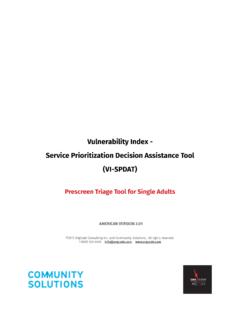Transcription of MOTIVATIONAL INTERVIEWING: FOCUSING ON …
1 Trai n e r De n n a Van de r s l o ot , M .E d. MOTIVATIONAL interviewing : FOCUSING ON CHANGE TALK The ATTC Network 2 Selective eliciting questions Selective reflections Selective elaboration Selective summarizing Selective affirming (William Miller , 2010) HOW MI IS DIRECTIONAL 3 MOTIVATIONAL interviewing : Helping People Change Third Edition Primary Source What s 4 A person-centered counseling style for addressing the common problem of ambivalence about change. A CLINICAL DEFINITION OF MI Miller & Rollnick, 2013 5 Sustain Talk Change Talk Ambivalence 6 Partnership Autonomy Compassion Evocation Spirit of MI 7 Engaging FOCUSING Evoking Planning FOUR PROCESSES OF MI 8 ENGAGING Shall we travel together? 9 Where shall we go? FOCUSING 10 Whether and Why? EVOKING 11 We are usually convinced more easily by reasons we have found ourselves than by those that have occurred to others. Blaise Pascal (1623-1662) 12 Recognize Evoke Respond CHANGE TALK 13 PREPARATORY CHANGE TALK DESIRE ABILITY REASON NEED WHAT S NEXT?
2 COMMITMENT is missing: I I plan I intend I am ready I will think I will DARN statements by themselves do not trigger change. CHANGE TALK Preparatory Desire Ability Reason Need Mobilizing Commitment Activation Taking Steps Behavior Change Amrhein, P. C., Miller, W. R., Yahne, C. E., Palmer, M., & Fulcher, L. Client commitment language during MOTIVATIONAL interviewing predicts drug use outcomes. Journal of Consulting and Clinical 71(5) Oct 2003, 862-878. Recognize Evoke Respond CHANGE TALK 17 Eliciting Change Talk Amrhein et al., (2003) 18 Can Counselor Influence Change Talk? Glynn & Moyers (2010) 19 Asking evocative questions Exploring the decisional balance Good things/Not so good things Elaboration Quer ying extremes Looking back/looking forward Exploring goals and values Using the Impor tance Ruler Coming Alongside HOW DO YOU ELICIT/EVOKE CHANGE TALK? 20 Providing Feedback Exploring other s concerns Exploring goals and values Honoring autonomy Running Start technique WHAT TO DO IF THE PERSON DOESN T SEEM TO EVEN BE AMBIVALENT?
3 21 Recognize Evoke Respond CHANGE TALK 22 Change talk often comes intertwined with sustain talk That s the nature of ambivalence ( W i l l i a m M i l l e r, 2 01 0 ) SNATCHING CHANGE TALK FROM THE JAWS OF AMBIVALENCE 23 I know I should keep taking the medication, and the voices do stop when I m taking it, but I can t handle the way it makes me feel. You don t like the way the meds make you feel. You recognize the importance of taking your meds One reason to take the meds is to stop the voices SNATCHING CHANGE TALK FROM THE JAWS OF AMBIVALENCE 24 I really don t want to quit cutting altogether, I know I probably should. I ve tried to stop before and it s hard. You really don t want to stop cutting You recognize the importance of not cutting You re not sure if you can quit. SNATCHING CHANGE TALK FROM THE JAWS OF AMBIVALENCE 25 RESPONDING TO CHANGE TALK ALL EARS E: Elaborating: Asking for elaboration, more detail, in what ways, an example, etc.
4 A: Af firming commenting positively on the person s statement R: Reflecting, continuing the paragraph, etc. S: Summarizing collecting bouquets of change talk 26 Elaboration/Example Affirm Reflect Summarize RESPOND USING YOUR EARS 27 Practices using Recognizing, Evoking and Responding strategies Work in triads or dyads Speaker plays role of script Listener plays role identified on card Identify change talk (internally) Use evoking strategy followed by EARS EVOKING PHASE EXERCISE 28 LISTENER ROLE are moving from FOCUSING to evoking : Select 2-3 Evoking strategies you want to use from card deck one strategy at a time and follow up with EARS before moving to the next strategy : to practice skills and gather change talk 29 30 OBSERVER ROLE Listen carefully to the speaker and using the Change Talk Observer Sheet write-down each piece of change talk you This is an important role because you can help your team WIN Mental Shifts: Evoke don t install motivation Requires a Focus Letting go of gathering the facts first MI Skills.
5 Eliciting change talk strategies OARS Developing Discrepancy EVOKING MENTAL SHIFTS & MI SKILLS 31 Miller, 2012 School of Medicine Department of Public Health and Preventive Medicine Northwest Frontier Addiction Technology Transfer Center 3181 SW Sam Jackson Park Rd. CB669 Portland, OR 97239 Traci Rieckmann, , Principal Investigator Denna Vandersloot, , Project Director 32 MOTIVATIONAL Inter viewing (2013), Miller & Rollnick Enhancing Motivation to change in Substance Abuse Treatment, Tip 35 National Clearing House (training tapes, ar ticles, bibliographies, training oppor tunities) (MI resources ATTC website) MOTIVATIONAL Inter viewing in Health Care (2008) Rollnick , Miller, and Butler. RESOURCES FOR LEARNING MOTIVATIONAL interviewing 33 Miller W. & Rollnick S. (3013) MOTIVATIONAL Inter viewing: Helping People Change. Rollnick S., Miller, W. and Butler, C. (2008) MOTIVATIONAL Inter viewing in Health Care. Glenn, , Moyer s, T.
6 B. (2010) Chasing Change Talk: The clinicians role in evoking client language about change. Journal of Substance Abuse Treatment, 39, 65-70. Amrhein, et al. (2003) Client commitment language during MI predicts drug use outcomes. Journal of Consulting and Clinical Psychology, 71 (5), 862-878. D`Ofrino, G. et al. (2005) Yale Brief Negotiated Inter view REFERENCES 34








